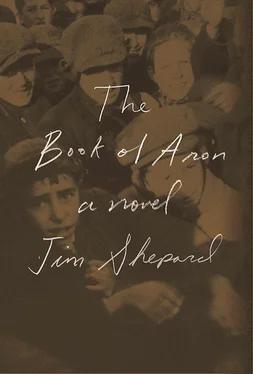They were pushed into our path and for a while we were carried along behind them. I wondered if he would recognize me but he didn’t. He and the heavy woman had to shout at each other to be heard. She asked how long he thought he could go without sleeping and he shouted back that when he was a young man his mother had come into his room in the midafternoon and dragged him out of bed by his feet. “She asked if that was how I wanted to become a doctor,” he shouted. “By staying out all night long. And I told her, ‘A doctor ? I thought I was studying to become a lush.’ ”
We followed them to the gate of the small ghetto at Chłodna, where the German and Polish police were checking identification. All of the orphanage wagons had passed through except the one with the potatoes, which sat still next to the guard hut. The driver had his hands on his hips and was watching two Polish policemen unhitch his horse. He’d pulled his bird mask down and it hung below his chin. A feather fluttered alongside his ear.
“What’s happening?” Korczak asked the Polish policeman in front of us. “Why has my wagon not gone through?”
“This isn’t your wagon,” one of the German policemen told him. “It’s my wagon.”
They argued in German about it. The heavy woman was terrified and tried to pull Korczak through the gate but he knocked her arm away. He shouted something at the German and then repeated it to the Polish policeman: that if the German didn’t release the potatoes he would report the theft to their superiors. The German’s bored expression disappeared and he said in Polish, “So you’re trying to frighten me, Jew?” and Lutek gave my shirt such a pull from behind that he ripped it.
“Are you with him?” a Polish policeman said, stepping in front of us. He pointed a baton at Korczak. “Is he drunk?”
“I don’t know what he is,” I told him, and Lutek pulled me again, and a woman with a chicken in a straw cage shouldered forward and almost knocked the policeman off his feet. He clubbed her once and then twice and Lutek shouted into my ear, “What do you think this is? A show ?” and yanked me so hard that I fell to my knees, and then he pulled me to my feet and dragged me down the street.
FAMILIES SQUATTED IN THE HALLS AND FOUGHT over sidewalks. One took over our stairwell near the top floor. They aired out their clothes and bedding on the railings. No one had said the ghetto would be closed and the markets outside the walls declared illegal. There were long lines in front of the food shops and everything was bought up. Our family of course wasn’t prepared and hadn’t saved any money. Two other families moved in with our neighbors across the hall and my mother said it was only a matter of time before someone moved in with us. When she complained about it my father reminded her that the Christian who owned the building had lived here thirty-seven years and then had to leave nearly all of her furniture behind. He cheered himself by reading the German casualty lists in the newspaper. He called it his Happy Corner. He also paid ten groszy extra for a German paper that showed photos of their cities after Allied bombing.
The small ghetto across Chłodna we heard had attracted the well-to-do Jews and was less crowded. Our neighbor told us that across the hall they were nine to a room. The family on our stairwell took in some extra relatives and bartered old clothes and saccharine on the street in front of our building and screamed and fought in the middle of the night. In the mornings we had to step over them when going down the stairs.
My parents fought too. My mother said we were living like castaways and the apartment was filthy and my father said if we didn’t have money for bread we didn’t have money for soap. She said that once we got the typhus we wouldn’t need money for soap and he said that once we got the typhus he’d never have to hear her complain again. My older brother told them that he didn’t think married couples should argue the way they did.
Sometimes if the fight was bad my mother would lie down next to me and weep. I’d put my hand on her head and tell myself I didn’t care what they did because I was going wherever I wanted and doing what I wanted.
But I wasn’t sleeping because of the lice. My mother finally boiled my sweater, which was so infested we could see it moving, but the nits survived boiling and could only be ironed out. They made gray oily stains when they melted under the iron, and were only gone for a while, since whatever we disinfected just got reinfested by everything else. It was so bad around my waistband that I looked like I was always adjusting my pants. I woke up scratching. In the morning I ran my fingernails through my scalp and dropped what I pulled out onto the hot lid of the stove so I could see them sizzle.
I got on the trolley still scratching and a Polish policeman told me to give him my coat. It was far too small to fit him and I showed him the elbows, which were worn through, and he said, “Give it here anyway.” I said sure and added that I’d just come from the hospital and had the typhus. I combed my hair with my hand and wiped the lice on my sleeve and stepped closer to him and he moved to the rear of the car and got off at the next stop.
My father came home from the fabric factory with what he said was good news. His cousin had converted part of the factory floor into a dormitory for refugees who could pay and so he had to let some workers go but my father hadn’t been one of them. He’d been worried about it because he and his cousin hadn’t been getting along. To celebrate he brought home bread and onions and marmalade, which we hadn’t seen since the rationing began, and which my brothers finished before I got back. We had the rest of the bread and onions with some kishke my mother made with steer intestines and some seasonings. My father didn’t read from the newspaper. A German truck went by with a loudspeaker and its only message in Polish was that it was now forbidden to speak of “the Jewish ghetto,” and the proper term was now “the Jewish quarter.” “How do you like it here in the Jewish quarter?” my father asked my mother. “I find it confining,” she told him.
LUTEK HAD ARRANGED A WAY OUT OF THE GHETTO even before it was sealed up. He showed me one morning in a downpour that had driven everyone else inside. Down an alley near Przejazd Street an apartment owner had built a cooplike shed with chicken wire and wood against the wall to keep people from stealing his trash bins, and inside the shed and behind the bins Lutek had chiseled out a passage that had started as a sewage drain. The smell was suffocating and when I first saw it I thought I’d never fit through. I had to go onto my back and push with my heels and squeeze one shoulder through at a time. I asked why he hadn’t made it any bigger and he said it was a lot of work and that the smaller the better and easier to hide and he liked that only we could fit through. The shed had a roof, so once we were inside no one could see us. And he’d nailed a piece of tin over the gap so even someone inside wouldn’t necessarily see it. I asked when he’d done this and he said after curfew. I said that it was amazing and he said yes, it was. I said he’d done all the work, and he agreed and said in honor of that our split would be seventy-thirty.
So for a few weeks we made out. He made a deal with some Polish boys, a gang from Łucka Street, and for five złotys a load they kept the blackmailers away. His father’s friends brought us what they wanted to barter on the other side, and we took out linens and silverware and tools and pots and pans and whatever would fit through, and brought back flour and potatoes and milk and butter and onions and meat. Lutek could drag in twenty kilos of potatoes or onions in one go. Sometimes on the other side there were kids we recognized haggling and filling their sacks. Smaller kids hopped onto the wall and waited there like squirrels. When the police showed up everyone disappeared into their holes.
Читать дальше












